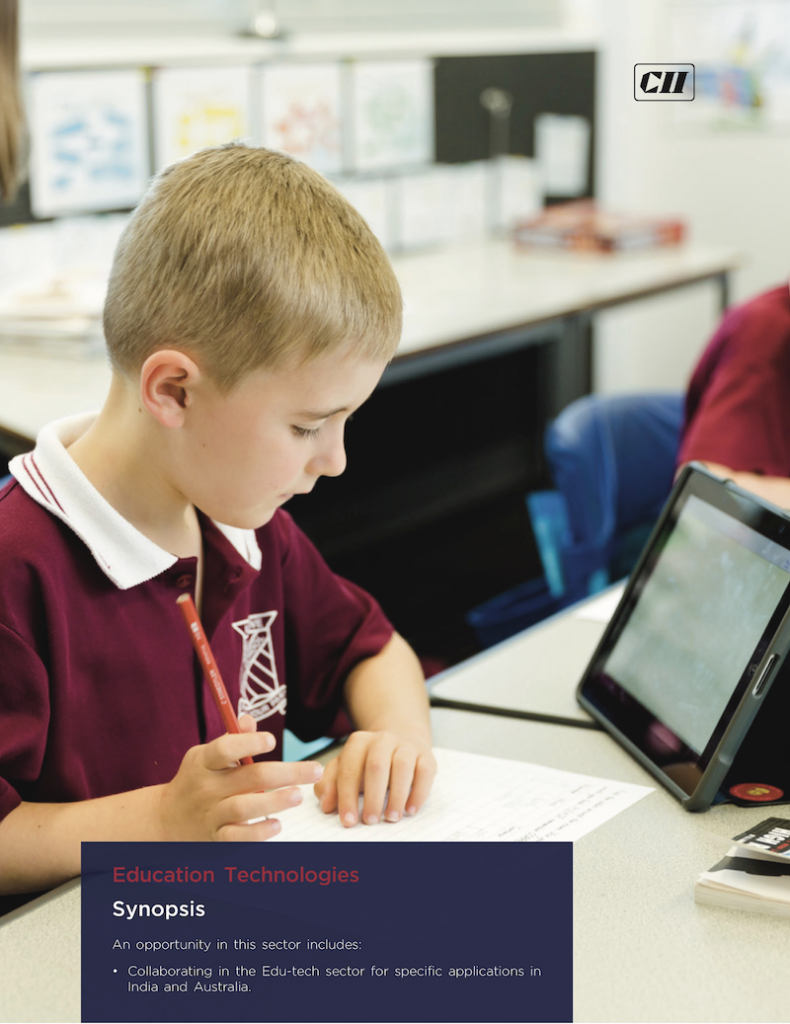Emerging Sectors
Education Technologies

Education Technology in Australia
The expanding network and increased reliability of mobile technology have enabled educational institutions in Australia to offer continuous learning and reskilling opportunities to its students.
Australia’s national open-access data network project and National Broadband Network will help growth in online education by providing technical efficiency through increased internet connections and speedy data transfers across the country. According to the Australian Trade
and Investment commission, there are over 350 Ed-tech companies servicing the Australian education sector, where there are approximately 1,100 online education providers, generating approximately ~AUD 3.3 billion (USD 2.2 billion) in revenue499. With the increase in technological
innovation and student demand for digitized education services, the Ed-tech market is expected to grow to ~AUD 1.7 billion (USD 1.1 billion) by 2020500. The Australian Government supports the appropriate use of technology in schools by providing AUD 51 million to support a range
of education projects undertaken to improve digital literacy amongst students and drive partnerships between information and communications technology (ICT) leaders and schools501.
Ed-Tech in Universities in Australia
Australia is pioneering the way with innovative, world class solutions within the education sector. Leading online providers in Australia include Ducere, Online Education Services, Open Colleges, Open Training and Education Network and Open Universities Australia502. A few emerging
education technologies that are being applied in schools and universities in Australia include adaptive learning platforms, which are used to measure student progress and engagement; the internet of things, which can be applied to student learning and campus activity to inform the direction of content delivery and institutional planning; artificial intelligence, which
is used to help colleges interpret data, improve administrative procedures and enhance online learning and research processes; and cloud computing, which has made the virtual exchange and accessing of data incredibly efficient. In higher educational institutes, Australia has also been fostering innovation by hosting over 110 in-house incubators and accelerator programs based in various universities. The Melbourne Accelerator Program, which is working with the University of Melbourne and ATP Innovations, which is working with the University of Sydney, University of Technology, Australian National University and University of New South Wales, were ranked thirteenth and fourth respectively in the global list of top 25 university incubators.
Schools
Schools in Australia have also integrated world-class solutions, platforms and programs to teach and engage students. West Australia has 95 out of the 1000 learning places for children to learn how to code, worldwide. South Australia has integrated robots and artificial intelligence in aiding its delivery of first-class world education. For instance, 3P learning is a
world-wide online education company that offers cloud-based resources to help students in grades K-12 to improve their academic performance. Victoria and Melbourne have adapted their K-12 curriculum and made it mandatory to accommodate machine learning and coding
in their curriculum for children in grade 10. They have made it mandatory to offer courses on digital and design technologies to enable students to think computationally and critically and arrive at solutions. Initiation of such an academic regulation will ensure that the youth of Australia is in pace with the growing technological demands of the economy504.
Private Sector
More than 15% of Australian start-ups are focused on the education industry, making education technology the second largest start-up industries in Australia505. There are more than 350 ed-tech companies servicing the entire education ecosystem. A large proportion of the ed-tech solutions provided include Software as a Service (SaaS) and app-based solutions that cater to businesses and consumers506. EduGrowth is a non-profit organization, which brings together leading innovators that aim to accelerate Australia’s borderless education to over 100 million students each year by 2025. Their vision is focused on three key areas, which include – connecting Australian education ecosystems, developing new products and services and driving global awareness and adoption of Australian education innovation.
Given that education is Australia’s third-largest export sector, Australia is committed to keep up with the pace of innovation in the hope to deliver world class education. The Australian Government, both at the national and state levels, supports the appropriate use of technology to prepare its students to thrive in the digital world.
Education Technology in India
The online education market in India is worth USD 247 million and is expected to rapidly grow to USD 1.96 billion by 2021507. The projected rapid growth can be attributed to the increase in internet penetration, Government’s digital initiatives and demand for low-cost alternatives, quality education and value-added services such as industry interactions and career counselling. The reskilling and online certifications is the largest sector supporting the online education industry, followed by primary and supplemental education and test preparation. Almost one-third of online learners believe that online education does not substitute for traditional learning due to the lack of interaction with peers and teachers508.
However, there is potential to expand the market for primary and supplemental education by integrating interactive e-learning in traditional classrooms, offering personalized and adaptive learning platforms to cater to all brackets of students in rural and urban areas and creating innovative technology solutions to allow access to offline content in areas that lack
adequate infrastructure facilities. Millennials in India are increasingly consuming content on digital platforms due to increasing speed of internet, reduced data prices and easy availability of smartphones. While the industry is still nascent, it is finding its way to minimize risks
and cybersecurity concerns. In the private sector, there is a healthy participation of VCs and investors, making India the fourth largest start-up destination. The ed-tech start-ups in India are making significant changes to the education sector and unlike multinational start-ups, they are known to understand the culture and system in India. For instance, the
IIMs via NIIT Imperia use Avagmah technology platform that offers solutions centering the learning habits of Indian learners. Byjus is one of India’s most popular ed-tech start-ups offering effective learning to students in grade 4 to 12 and has recorded 12 million users on its platform in 2017. The Indian Government, in support of this emerging opportunity,
has been implementing various initiatives to promote digital learning. The Government has introduced initiatives such as SWAYAM, India’s own MOOC platform, National digital library with 6.5 million books and a subsidized tablet named “AAKASH”, which is the cheapest tablet in the world. India has a growing trajectory in the education sector and is giving rise to many opportunities for companies, domestically and internationally, to cater to its
rising demand.
Opportunities in Education Technologies
Technology will increasingly change the way education services are delivered and consumed in India. Online education will be pivotal in helping India meet its extensive educational needs. Australia and India should create platforms to enable collaboration on the online delivery of
education in India. Since fund availability and brand recognition are among a few issues that most start-ups within the realm of education technology face, Australia can collaborate with India to build density, capability and global brand recognition of their educational technology products. This collaboration will substantially benefit India by meeting its growing demand for Vocational Educational Training (VET). It can partner with the Indian Government and local universities to achieve effective outcomes. Australia’s vocational education online training platforms offer highly interactive training and assessment support that can be used to train
students in India. For instance, Didasko Learning Resource in Australia offers special courses in hospitality and retail sectors and other comprehensive resources that can help learners achieve high learning results and improve overall operational effectiveness509. Collaboration
on such education technology fronts will offer flexibility to not only Indian students but also recognition to Australian institutions. Education technology will also offer technology solutions to bridge gaps in India’s developing educational sector. These solutions can be used to make
up for staffing shortages in schools, maintain uniformity in quality of content, offer varied courses in less developed subject materials like humanities and arts and most importantly provide cost-effective and standard quality accessibility of education to all of its students.
Opportunity for Australian investors in the Edu-tech sector in India
India has a relatively young population with one of the largest populations under the age of 25 and hence a vast market exists for investments into the Indian education and ed-tech space. The Indian government has allowed 100% FDI in the education sector. As per FDI India, the Indian online education sector is expected to reach USD 1.96 billion by 2021 with support
from ~9.5 million users. The Indian Ed-tech sector thus offers various attractive opportunities for Australian investors.
Recommendations
- Indian government should encourage Australian companies to invest into the education tech space in India.

499 The Australian edtech industry, Austrade
500 Edtech in Australia, Government of South Australia
501 Support for Science, Technology, Engineering and Mathematics (STEM), Department of Education, Australian Government
502 IBISWorld Industry Report X0008, Online Education in Australia, 2017
503 IBM Watson helps Deakin drive the digital frontier, Deakin University website
504 Universities Australia, University Start-up Support Programs, 2017
505 Start-up Muster, 2017 Annual Report
506 Australian Education Technology Report, 2017, Austrade
507 India’s online education industry to reach USD 1.96 billion by 2021, Business Standard
508 Online Education in India: 2021 Report, 2017, KPMG
509 The Australian edtech industry, Austrade